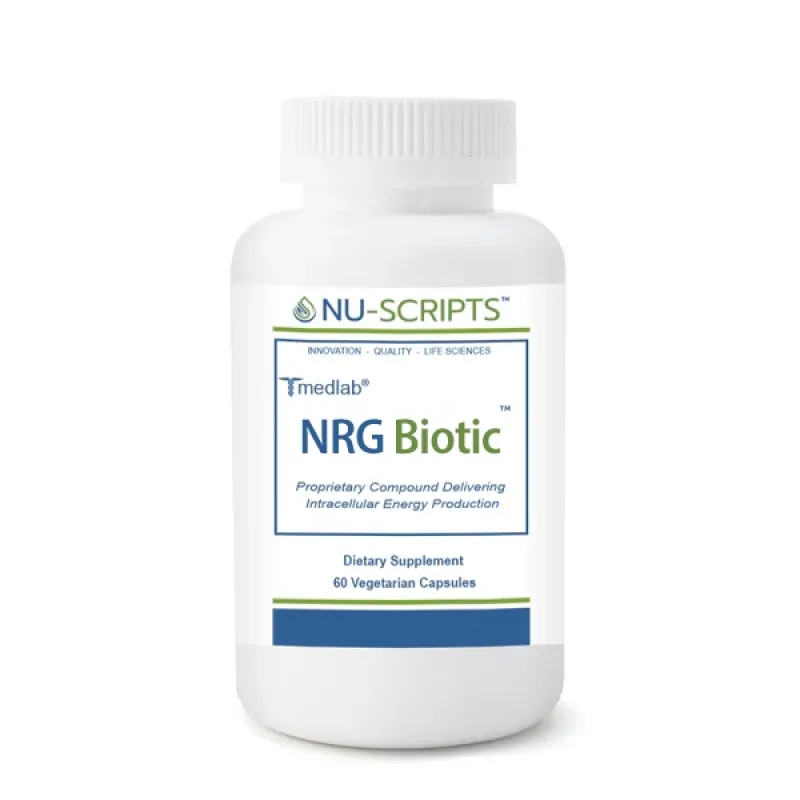NRG Biotic™
- $49.99
- Quantity Tier Pricing
- 2 or more $37.49
- 12 or more $27.49
Nutritional and Microbial Support for Neuromuscular and Cellular Function
1. Magnesium
Overview:
Magnesium is an essential mineral involved in over 300 enzymatic reactions, including those critical for energy production, nerve conduction, muscle relaxation, and neurotransmitter balance. It serves as a natural calcium channel regulator and stabilizer of neuronal membranes.
Health Benefits:
-
Neuromuscular Function:
Facilitates muscle relaxation and prevents excessive neuronal excitability, reducing the risk of cramps, twitching, or restlessness. -
Energy Metabolism:
Acts as a cofactor in ATP synthesis and supports mitochondrial efficiency. -
Neurotransmitter Regulation:
Modulates GABA and glutamate signaling, promoting calmness and balanced neural activity. -
Cardiovascular and Metabolic Health:
Supports normal heart rhythm and insulin sensitivity.
Clinical Insight:
Adequate magnesium status is essential for neuromuscular stability, sleep quality, and mitochondrial performance. Deficiency is common and often contributes to fatigue, irritability, or muscle discomfort.
2. Ubidecarenone (Coenzyme Q10, CoQ10)
Overview:
Ubidecarenone, commonly known as Coenzyme Q10 (CoQ10), is a lipid-soluble quinone that functions as a critical electron carrier in the mitochondrial electron transport chain and as a powerful endogenous antioxidant.
Health Benefits:
-
Mitochondrial Energy Production:
Facilitates ATP synthesis, supporting the energy demands of muscle, heart, and neural tissues. -
Antioxidant Defense:
Protects lipid membranes and mitochondrial DNA from oxidative stress. -
Neurological Support:
Enhances neuronal energy metabolism and mitigates oxidative neurodegeneration. -
Cardiovascular Protection:
Improves endothelial function and supports cardiac efficiency.
Clinical Insight:
CoQ10 is particularly beneficial in individuals experiencing fatigue, neurodegenerative conditions, or statin-induced CoQ10 depletion. It works synergistically with magnesium to stabilize cellular energy and neuromuscular performance.
3. Lactobacillus acidophilus
Overview:
Lactobacillus acidophilus is a probiotic bacterium naturally present in the human intestinal tract. It supports digestive and immune health while influencing the gut–brain axis, a key pathway linking intestinal and neurological function.
Health Benefits:
-
Digestive Health:
Promotes healthy gut flora balance and supports nutrient assimilation. -
Immune Modulation:
Enhances mucosal immunity by stimulating immunoglobulin A (IgA) and balancing inflammatory responses. -
Gut–Brain Communication:
Produces neurotransmitter precursors such as GABA and serotonin metabolites, supporting emotional balance and cognitive function. -
Barrier Function:
Strengthens intestinal integrity, preventing translocation of inflammatory compounds.
Clinical Insight:
L. acidophilus contributes to neurocognitive stability and immune homeostasis by improving gut health and reducing systemic inflammation — key factors in supporting optimal nervous system performance.
4. Streptococcus thermophilus
Overview:
Streptococcus thermophilus is a thermophilic probiotic species widely used in fermented dairy cultures and human probiotic formulations. It supports digestive comfort and complements other beneficial bacteria in maintaining microbial diversity and gut resilience.
Health Benefits:
-
Digestive Enzyme Support:
Produces lactase and other enzymes that enhance lactose digestion and reduce gastrointestinal discomfort. -
Immune Enhancement:
Modulates the immune response and supports mucosal defense. -
Gut Lining Protection:
Promotes the production of short-chain fatty acids (SCFAs) that nourish intestinal cells. -
Synergistic Function:
Enhances colonization and activity of other beneficial bacteria such as Lactobacillus and Bifidobacterium species.
Clinical Insight:
S. thermophilus supports a balanced gut microbiome and contributes to neuroimmune stability by promoting intestinal integrity and microbial synergy.
5. Bifidobacterium bifidum
Overview:
Bifidobacterium bifidum is a commensal probiotic species predominant in the colon, essential for immune regulation, gut barrier integrity, and nutrient metabolism. It is particularly important in maintaining balance within the gut–brain axis.
Health Benefits:
-
Immune Regulation:
Supports T-regulatory cell function and reduces pro-inflammatory cytokines. -
Intestinal Barrier Protection:
Strengthens mucosal layers and reduces intestinal permeability (“leaky gut”). -
Neurocognitive Health:
Influences neurotransmitter production and helps moderate the stress response through the hypothalamic–pituitary–adrenal (HPA) axis. -
Digestive Balance:
Reduces gas, bloating, and discomfort associated with dysbiosis.
Clinical Insight:
B. bifidum contributes to neuroimmune communication and mood stability, making it a valuable component in formulations targeting both gut health and neurological well-being.
* Please be aware that packaging displayed on our website may vary from your order based on factors such as availability and supplier changes, or to improve the readability of product details.
* These statements have not been evaluated by the Food and Drug Administration. This product is not intended to diagnose, treat, cure, or prevent any disease.
Tags: nrg biotic , medlab nrg biotic , fx gba , medlab fx gba ,






